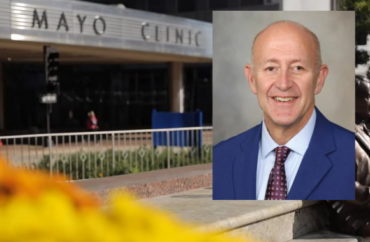
A Mayo Clinic College of Medicine professor recently filed a lawsuit against the college after it punished him for sharing his views with the media on controversial topics such as COVID-19 treatments and testosterone’s effects on athletic performance.
He also criticized the National Institutes of Health, a major financial backer of the clinic.
Anesthesiology Professor Dr. Michael Joyner’s lawsuit alleges Mayo Clinic leaders breached the employee contract’s anti-retaliation, academic freedom and appeals procedure policies.
The lawsuit alleges that “when Joyner was interviewed regarding important scientific issues of public concern, Mayo took swift action to silence and punish Joyner for following his scientific conscience.”
Joyner was given a one-week unpaid suspension after he made comments to media outlets that concerned Mayo Clinic leaders, The College Fix reported in June. At the time, he was told by his superiors, under threat of termination, to refrain from speaking to the media unless given permission, according to a copy of a memo to Joyner.
“Joyner had only summarized his research regarding testosterone’s impact on athletic performance and advocated for a faster NIH response to emerging COVID-19 treatments. But these issues, and Joyner, were inconvenient to Mayo’s revenue-focused agenda led by its CEO Gianrico Farrugia,” the lawsuit claims.
In a 2022 New York Times article, Joyner’s opinions had “proved problematic in the media and the LGBTQI+ community at Mayo Clinic,” according to the memo Joyner had received from the college’s chair of the anesthesiology department.
But the clinic’s “Freedom of Expression and Academic Freedom Policy” states it will allow employees “free and open discussion of ideas,” including the “freedom to explore all avenues of scholarship, research, and creative expression and to reach conclusions according to [their] own scholarly discernment.”
The policy adds it will protect faculty from “fear of retribution or retaliation if those opinions and conclusions conflict with those of the faculty or [Mayo as an] institution.”
At issue are comments Joyner made to a couple news outlets, including in June 2022, when Joyner told the New York Times that, when it comes to telling the difference between biological males and females, “you see the divergence immediately as the testosterone surges into the boys,” he said. “There are dramatic differences in performances.”
Joyner said “there are social aspects to sport, but physiology and biology underpin it… testosterone is the 800-pound gorilla.”
In January of the year, Joyner also spoke to CNN about the benefits of convalescent plasma as a treatment for immune-compromised individuals who contract COVID-19 and expressed his frustration with the government and other medical professionals who discount plasma as an effective course of treatment.
He was also quoted as saying he was “frustrated” with the NIH’s “bureaucratic rope-a-dope,” and called the agency’s guidelines a “wet blanket” that discourages doctors from trying convalescent plasma on these people, CNN reported.
Joyner’s lawsuit alleges that the day after CNN published the article, “Mayo initiated a disciplinary process against Joyner for his interview comments because they criticized the NIH, and Mayo administrators were worried that NIH would retaliate by cutting their funding.”
In 2022 alone, Mayo received $320 million from NIH, placing the clinic in the top 1 percent of NIH funding recipients, according to the lawsuit.
Although the Foundation for Individual Rights and Expression is not defending Joyner in the lawsuit, the civil liberties group has been staunch advocates for the professor’s free speech rights and are in support of his decision to sue the college.
The lawsuit “represents a really important pushback against universities who censor their faculty with impunity,” Zachary Greenberg, a FIRE senior program officer, told The College Fix in a phone interview.
“On one hand, we’re disappointed this professor had to resort to litigation to get the university to adhere to its promises. It’s disappointing that the university wouldn’t just protect free speech rights going forward,” Greenberg added. “On the other hand, it is great to see a professor standing up for his free speech rights. It’s a very difficult thing to do, and we wish you the best of luck in the lawsuit.”
Joyner is asking for monetary damages and an order that the defendants “cease their retaliation and interference with Joyner’s communication about his research.”
“In his 36 years at the Mayo Clinic, Joyner had participated in hundreds of media interviews without incident,” the lawsuit states. “Yet in March 2023, Mayo disciplined Joyner for media interview statements regarding his own research and conclusions.”
Greenberg laid out what he believed to be the optimal outcome of Joyner’s case.
“The optimal scenario is for the court to hold Mayo accountable for violating its promises of free speech and provide damages to Joyner for this violation of his free speech rights. A large number would be preferable to deter other universities from doing this to their faculty,” Greenberg told The Fix.
In an emailed statement to The College Fix, the clinic defended its actions.
“Mayo Clinic did not discipline Dr. Joyner for statements he made about testosterone or transgender athletes,” the statement said. “Mayo disciplined Dr. Joyner for continuing to treat coworkers unprofessionally in violation of Mayo policy and for making unprofessional comments about the National Institute(s) of Health’s (NIH) guidelines for convalescent plasma.”
“Dr. Joyner’s comments about the NIH were not the expression of a scientific opinion, as is protected by our academic freedom policy. Instead, his comments were the unprofessional venting of his personal frustration with the NIH’s decision not to recommend a therapy he had championed.”
MORE: Mayo Clinic professor suspended after saying testosterone improves athletic performance
Like The College Fix on Facebook / Follow us on Twitter





Please join the conversation about our stories on Facebook, Twitter, Instagram, Reddit, MeWe, Rumble, Gab, Minds and Gettr.